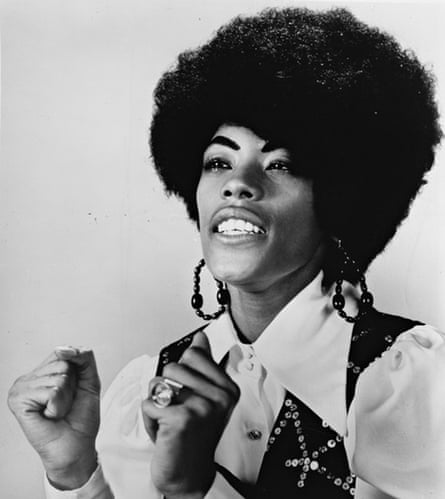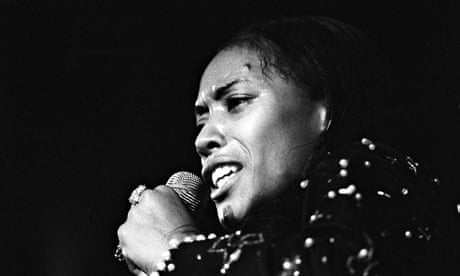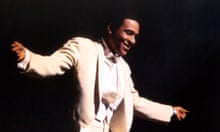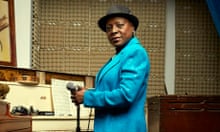There's a common cliche in music biopics that you might call the eureka fallacy. Our hero is having a conversation or strumming a guitar when inspiration strikes and boom! — there's the song that will define them forever. It always looks hokey and implausible but sometimes that's really how it happens.
One evening in Memphis in 1973, soul singer Ann Peebles was meeting friends, including her partner, Hi Records staff writer Don Bryant, to go to a concert. Just as they were about to set off, the heavens opened and Peebles snapped: "I can't stand the rain." As a professional songwriter in constant need of new material, Bryant was used to plucking resonant phrases out of the air and he liked the idea of reacting against recent R&B hits that celebrated bad weather, such as the Dramatics' In the Rain and Love Unlimited's Walking in the Rain (With the One I Love).
So he sat down at the piano and started riffing on the theme, weaving in ideas from Peebles and local DJ Bernie Miller. The song was finished that night and presented the next morning to Hi's studio maestro, Willie Mitchell, who used a brand new gadget, the electric timbale, to create the song's distinctive raindrop riff. It really was that easy. "We didn't go to the concert," Bryant remembers. "We forgot about the concert."
Pop music is the only artform where your life can be changed forever by one good night's work. In the short run, I Can't Stand the Rain made Peebles's name. In the years since, it has been covered and sampled by dozens of artists, including Tina Turner, Missy Elliott and Seal. Now it's emerging again, as five albums Peebles made for Hi are reissued. She would still be singing the song if not for a stroke two years ago. Her voice has been slow to recover so she speaks on the phone from Memphis with a slight slur and frequent heavy sighs, although her good humour and memory appear to be undimmed.
Peebles was born in St Louis, Missouri in 1947, the seventh of 11 children, all of whom sang in the Peebles Choir for her father, a Baptist minister. During a trip to Memphis with one of her brothers in 1968, she began singing with bandleader Gene "Bowlegs" Miller, who introduced her to his employers at Hi Records.
Founded in 1957, Hi was about to hit its stride as a soul label with releases from OV Wright, Otis Clay, Syl Johnson and its only superstar, Al Green. While Motown and Stax were fuelled by intense rivalries and bullish egos, Hi was a cosy operation, largely thanks to Mitchell. As artist, producer, songwriter and, eventually, vice-president, he set the tempo. His production style was smooth and inviting with just the right amount of heartache and southern grit.

"Willie Mitchell was like a father and the musicians were like brothers," Peebles says. "It was like a family."
"He looked out for everybody," Bryant confirms. "He was easy to get along with as long as you were doing the things he wanted."
Mitchell put his new signing together with Don Bryant. Lifelong Memphis resident Bryant is a mellow, avuncular 71-year-old who seems to have nothing but good memories about his "real nice" time at Hi. However, the two didn't immediately click. "No we didn't," Peebles says, laughing. "We bumped heads."
Bryant resented being distracted from his solo career while Peebles didn't like being coached when she'd been singing since she was in kneesocks. But, gradually, they came to appreciate each other's strengths and realise how much they had in common. Their flourishing relationship soon bled into the songs. Written while they were on the road together, 1971's 99 Pounds ("Good things come in small packages") was Bryant's flirtatious gift to his new love. "I thought it would be a good introduction," he says. "A good song for her to brag on herself."
In 1974 they were married and celebrated their relationship on the song Until You Came into My Life. Peebles recites the lyric fondly: "'I never knew the meaning of true love.' We wrote that song together. 74 was a great year."
It was also when she met John Lennon, who was not having such a great year. This was during his infamous 18-month "lost weekend", when he swapped New York and Yoko Ono for a messy new life in LA. Lennon had excitably dubbed I Can't Stand the Rain "the best song ever" and went with friends to see Peebles perform at the Troubadour that February, where he proceeded to get hammered, stick a Kotex sanitary towel to his head and express his attraction to the singer in hair-raisingly graphic terms during her set.
"I don't think I was angry," says Peebles, amused by the memory. "I think I just smiled and kept singing."
Did he ever apologise? "Oh yeah, he really did. He was drinking. He didn't know what he was doing. He found me the next day at the hotel and he said: 'I'm so sorry. I made a monkey out of myself.' And I told him that was all right, I understood."
Peebles and Bryant couldn't have predicted that I Can't Stand the Rain would become part of the fabric of pop, despite reaching only No 38 on the US pop chart. "You could always feel good about a song but I don't think anybody knew for sure this would be a hit," says Bryant. "We were hoping that every song we did would be a hit." Nor did they realise it would prove unrepeatable. Peebles had 10 more R&B hits, including the magnificently vengeful I'm Gonna Tear Your Playhouse Down and the punchy, ominous Beware, but never came close to the mainstream again.
Some critics reckoned Peebles had the talent necessary to be a star but not the outsized personality. Mitchell had another theory. "She was the girl with the big voice who could have really gone further," he told Blues & Soul magazine in 1987. "But I don't think Ann spent enough time thinking about what she needed to do. I don't think she put as much energy into her career as a singer as some of the rest of these people."
Peebles doesn't exactly disagree. "I was happy the way I was. I still did a lot of songs but at that point I was married, I had a child and I was happy. Knowing [stardom] would take me away from what I was really like, it didn't bother me that much."
She recorded her last album for Hi in 1978, just after the label was sold and relocated to Los Angeles, then dropped out of sight for a decade. "It was kind of my choice," she says. "I tried other producers and it just wasn't the same. I was used to Willie coaching and telling me how to do things. It was hard to go into a studio and have somebody just sit there and push knobs."
Peebles has only made a handful of albums since. You wonder if she ever resents how that one night of bottled lightning has overshadowed everything else she's done, but resentment isn't her style. "It kept me going, everybody recording it," she says. "It helped me to know that somebody was listening and recognising my talents. Of course, there's a lot of stories in a lot of the songs I wrote but that's the one people recognised. I never get tired of telling that story."




Comments (…)
Sign in or create your Guardian account to join the discussion